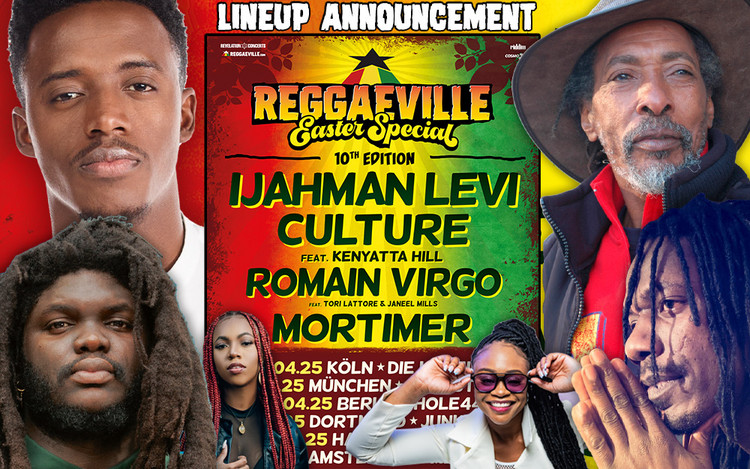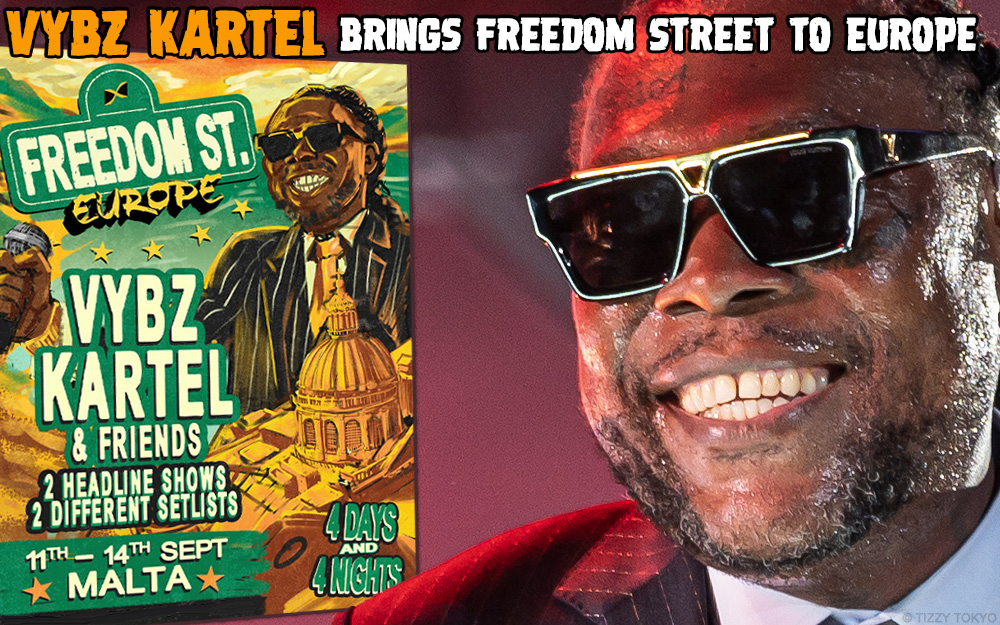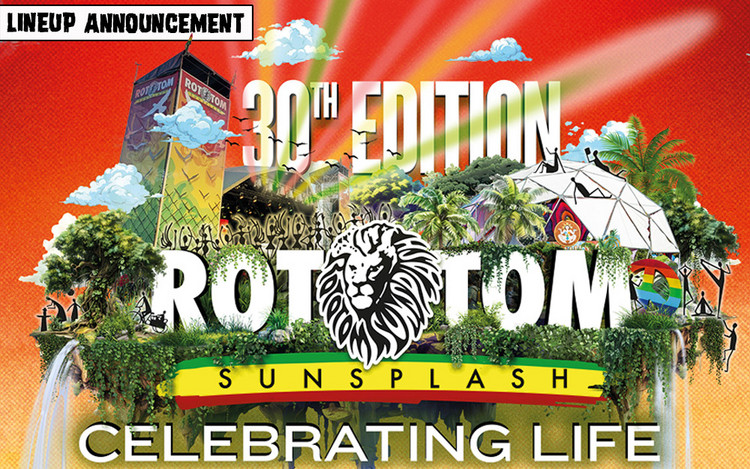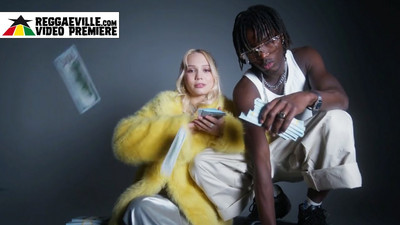Dub Inc ADD
Interview with Dub Inc
10/25/2013 by Valentin Zill
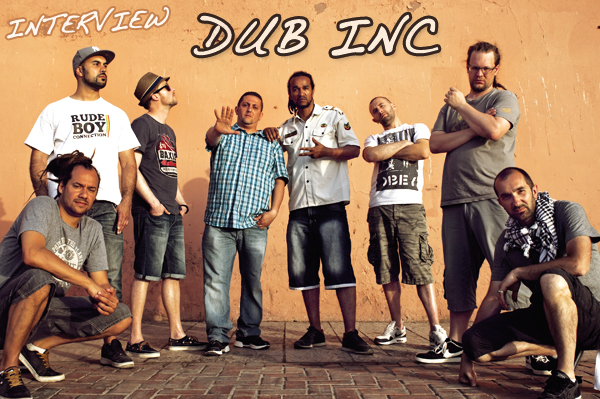
Much has been said and written about the success of non-Jamaican reggae artists on the global stage. For their last album Hors Contrôle, the French band Dub Inc toured through 27 countries on four continents. The group with the signature style that mixes reggae with Algerian raï and dub effects, is arguably today‘s most successful reggae band worldwide. The band from Saint-Étienne, France now presents Paradise, their fifth studio album. REGGAEVILLE called Zigo, Dub Inc‘s drummer, and Komlan, one of the group‘s two singers to talk about their new album, a combination with Santana, and their approach to music.
You aren‘t doing actual dub music, so where does your name come from?
Komlan: When they started Dub Inc, they played only instrumental music. I think that‘s why they chose Dub Inc. Later on, when we started to tour together with the entire band, we didn't change it. At that time, we were big fans of Asian Dub Foundation. And it was the same thing. It was just how you treat the sound, it was not a question of doing dub instrumentals. Dub is a term born in the studios. Overdub is a way to treat sound and take away the vocals and add reverb effects, at the time where they worked with four tracks. Why should we have changed the name if it works with the sound we wanted to do: dub sound with vocals. Incorporating dub into our music was important to us.
How has your style evolved over the years?
Zigo: When we were finally eight members, with Komlan and Bouchkour on vocals, we found our identity by remaking some Jamaican tunes which we love a lot, and adding our influences to it, which are numerous. We tried to both copy exactly Jamaican riddims and the vocal style of the Jamaicans. But we didn‘t want to sing about Ganja or religion, as we had other topics that were more important to us.
Komlan: More personal stuff...
Zigo: ... like social issues.
Komlan: It‘s right that all of that defined a bit the style of Dub Inc over the years. We never changed our way of doing music. We never wanted to copy the sound of others, but bring our own influences to reggae.
Many French reggae bands have recorded albums in Jamaica recently. Why did you record Paradise in Europe?
Zigo: Because our method of recording is really special. We need a special desk, and need to work in the studio all the time. We need a 24/7 studio just for us. Generally, for example in Jamaica, you can't have a 24/7 studio. You can rent half of the day, but then you have Capleton who needs the studio, and then somebody else. It's like that in every studio. If you ask Danakil, they have been there and they have recorded in five or six studios. And that's not good for us. We never record live all together in the same room. We always start with the the drums, then the bass, then we edit everything very clean, then we add the keyboards, we edit, ... It's a very long process, but it's how we work now. Maybe the next album we're gonna record live, but for the last two albums, we wanted to work like this.
You like to do combinations with other artists. One that hasn‘t made it to Paradise is a special featuring with Santana you told me about at this year‘s Garance Reggae Festival.
Komlan: Well, that was one of the most unbelievable encounters in the history of the band. We played at Paleo Festival, a huge festival in Switzerland. We played on the same stage as Carlos Santana, who played right after us. He had watched our show, and afterwards he came to felicitate us and to talk to us. We were already very, very happy. Then he asked me and Bouchkour to join him on stage. We were a bit afraid initially... It was a big moment in the history of Dub Inc. If something like that happens to you - it‘s something authentic. It wasn‘t organized by a label, it wasn‘t calculated or forced. It worked very simply and naturally. That‘s what we love. We don‘t care about the bigness of an artist. We are strong if there are positive vibes.
Zigo: You know, we did a lot of featurings like that one. The first time together with Tiken Jah (Fakoly; the author), for example. Or David Hinds. He went to Saint-Étienne in 2005, I think, to record with us in our tiny studio. We met him again last year in Colombia. Not all of our encounters are cool, not all the featurings lead to friendships. But if they work, it‘s an awesome sensation.
Paradise comes with a few interesting combinations. Meta Dia is on board, Alif Naaba, Jah Mason, and Skarra Mucci.
Komlan: We also have musical featurings, not only vocal ones.
Like Tiken Jah‘s brass section.
Komlan: Voilà, and there‘s a guy who plays the mandola, a guitar from North Africa, his name‘s Alaoula (Idir; the author). There‘s Issouf (Mounkoro; the author), he plays the kora. We also have a percussionist supporting us on a tune. It‘s interesting to have vocal guests, but for us it was just as interesting to have other musicians joining us to create new sounds a bit different from what our fans are used to.
Zigo: As we said before, these featurings are really interpersonal encounters. Meta and Alif, for example, we love their voices and we asked them to come to record a song with us. We aren‘t looking for names.
Komlan: All of our guests visited us in studio. Skarra Mucci came from Germany to record with us. Meta was already in France, we profited from that. We flew in Alif Naaba from Burkina Faso so that he could record with us. That is important to us, to actually record the featurings together.
Zigo: Even Jah Mason. It‘s horrible to a Jamaican what we do. They like to work fast in studio. The poor guy, we made him spend three days in studio with us. He didn‘t understand the way we work. There are many artists who don‘t understand how we can spend hours working together on a single tune. He liked it much. We did a great tune with him.
You sport a democratic approach to recording music. So how do you actually create songs and record them?
Zigo: When we start to write an album, all the musicians will bring some riddims. We listen to maybe 40 or 50 riddims, then we try to check what the singers prefer really. We also try to give some ideas of melodies to find out which instrumentals are the best. When we have chosen like 25 riddims, we start to work on them together, because we really need all of us together to give it the touch. And it changes a lot generally from the initial riddim to the result on the album. Then the singers work on the lyrics on their own, and finally we work all together again.
Komlan: When we start to record, all the songs are finished.
Zigo: We record the songs maybe three times before we do the last studio session. Sounds like you‘re really into pre-producing.
Sounds like you‘re really into pre-producing.
Zigo: We pre-produce a lot. A lot more than we produce, actually.
Paradise has more English lyrics than I‘m used to from your albums.
Zigo: That's maybe because we tour more outside of France, so the singers speak better English.
Komlan: Yeah, it's easier now.
Still, you don‘t seem to deem French skills important to enjoy your music?
Komlan: I'm sure that if you don't understand anything, you can still understand the message and the vibes. And if you see us on stage, we are like a metaphor of our music. Different colors, different vibes. I think our music explains what we sing about, the way how we mix the different influences and styles, show unity.
Zigo: Valentin, honestly, it's not just about French. In France or in Germany - maybe not in Germany, because you speak English very well, but in most of the places in Europe - nobody understands half of the English lyrics. It's like that. Not everybody speaks English, at least not well enough to understand rap lyrics or Jamaican Patois. Sometimes you just hear one or two words that can bring you to the topic, and you feel the vibe of the music.
One more thing: Zigo runs Greenyard Records, and your bassist Moritz von Korff Oneness Records. You've done quite a few selections already. How did you get into that, and how do you find time to work on such projects besides your busy touring schedule?
Zigo: It just started because at one point there was a Jamaican artist in Saint-Étienne, and I proposed to the band that we could to a featuring. Nobody was interested. But I was so eager that I said, OK, I will do it by myself. And I did it by myself. Then I realized that I could also produce some work by myself when I have time, just for fun. That's what I do. Sometimes I have more time to work on it. In the last six months I haven't done anything, because we worked so much with the band - the new album, tour, and the family. But I still have many songs produced already that I want to release. Right now, I don't have time to take care of it. I will, once I have the time to do it. I wouldn't call it a hobby, because I work a lot on it when I can. It's just another project.
And I guess it's something where you actually have to bring money, instead of earning it.
Zigo: Yeah, I bring my own money. I try to earn some of it back, but with the crisis, it's not easy to sell music. For me it's not so important. Now, with the experience and the connections I have to some artists, I start to provide artists with riddims for their albums. It's a good way for me also to work on other projects.




